MAY 1-3, 2023
Discover. Predict. Transform. Achieve.
Connect with innovators, peers, and professionals who help shape the future with data-driven insights and explore new solutions you can implement immediately!

The Premier Data and Analytics Event
Minitab Insights Global Conference 2023
Minitab Insights Global Conference is the premier, customer-focused data and analytics event for all innovators and industry experts looking to extract more value from data. This annual event connects the brightest minds from top organizations to learn, network, and discover valuable insights from their data and achieve excellence through our best-in-class suite of tools and solutions. These visionaries gather with a single mission; to advance business, life, and humanity forward with the power of data and analytics.
The Minitab Insights Global Conference is where visionaries gather with a single mission; to advance business, life, and humanity forward with the power of data and analytics.
Collaborative Sessions
Connect with professionals and thinkers who help shape the future with data-driven insights. You will have the opportunity to hear from engaging and inspiring speakers along with endless opportunities to expand your network. Explore new solutions that you can implement immediately!
At Minitab Insights Global Conference 2023 you will:
- Discover new ways to use Minitab Solutions to achieve results and transform your organization. From the beginner to the advanced user, Minitab Insights has something for everyone.
- Minitab customers from a variety of industries will share how they have used the tools to predict, analyze and improve processes that produce positive results.
- Grow your network and build strong relationships with others who are eager to learn and share innovative and proven techniques to transform their organization.
- Go beyond the basics and take a deep dive into the robust tools that other users, like you, have utilized to achieve results.
2023
FEATURED
SPEAKERS

 Michelle Ruehl
Michelle Ruehl
Michelle “Sonic” Ruehl is an Air Force Instructor Pilot with over fifteen years of service. She flew four different aircraft and amassed over 2000 hours, including 807 combat hours in Afghanistan, providing real-time airborne targeting data to Special Operations forces. While in Afghanistan, she also volunteered to teach English to local school girls as well as a group of young Afghan men studying Business. For her service, she earned seven Air Medals, two Aerial Achievement Medals and a special award for volunteer work, the Military Outstanding Volunteer Service Medal.
After her last deployment, Sonic returned to the U.S. Air Force Academy (class of ’03) to teach Rhetoric and Composition in the Department of English and Fine Arts. She taught courses in Writing and Public Speaking. When she was not in the classroom, she was the theater director, equestrian team mentor and worked down at the airfield teaching cadets how to fly the T-53 in the Air Force Academy’s Powered Flight Program. She found it incredibly rewarding to help the next generation of officers reach their dream of becoming military aviators.
Sonic brings 15 years of rhetoric, communication, and debriefing skills to the Afterburner team. She earned her M.A. in Teaching Writing and Rhetoric from the University of Colorado and traveled to Ghana where she taught civic leaders how to develop community improvement plans. In Tanzania, she taught children how to write music. In Nepal, she taught English to Tibetan refugees at a Buddhist monastery. She also worked as a speechwriter for a three-star general, preparing her for public engagements and developing strategic corporate messages for dissemination to 7000 personnel. Additionally, at the request of the Secretary of the Air Force Heather Wilson, she designed and taught a communication course to the Air Force headquarters staff at the Pentagon.
To honor fallen military colleagues, Sonic founded Parwana LEADership Legacy, a 501c3 non-profit organization whose mission is to provide leadership camps to veterans and their families to enhance empathy, communication, and teamwork so youth can then use these concepts to lead others. Through these programs, Sonic uses her M.A. in Psychology, as well as her certification as an Equine Specialist in Mental Health and Learning (ESMHL) to teach children, veterans, and survivors of trauma how to heal from their experiences and become empowered leaders in their community.
Sonic excels at helping teams become their best by aligning their communication processes with their strategic goals, so she was thrilled to join the Afterburner team in 2018! She is currently serving in the Air Force Reserves for the 302nd Airlift Wing at Peterson Air Force Base. She lives in Colorado with her husband, who flies for a major airline, and their baby girl.
https://www.afterburner.com/michelle-sonic-ruehl/
Executive Consultant
Former MC-12W Mission Commander, T-53 Instructor Pilot, USAF
Get ready for some serious innovation and motivation from our keynote Michelle “Sonic” Ruehl, former MC-12W Mission Commander, T-53 Instructor Pilot, USAF.

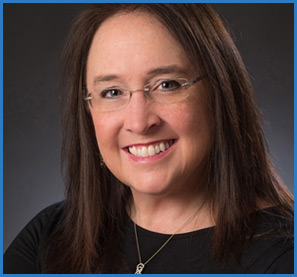
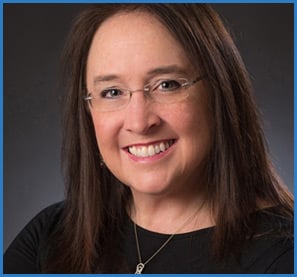 Valerie A. Logan
Valerie A. Logan
Founding The Data Lodge in 2019, Valerie is as committed to data literacy as it gets. She believes that in today's digital society, data literacy is not just a work skill- it's a life skill. With advisory services, train-the-trainer bootcamps, an extensive resource library and community services at The Data Lodge, Valerie is certifying the world’s first Data Literacy Program Leads across commercial, nonprofit and public sectors. Previously, Valerie was a Gartner Research VP as a member of the Office of the CDO (Chief Data Officer) research team. She led Gartner’s Annual CDO Survey, as well as the CDO Circle executive training and networking event, which she designed from scratch. She pioneered Gartner's research in the area of Data Literacy and nurturing the “speaking of data” by inventing Information as a Second Language® (ISL). In 2018, she was awarded Gartner’s Top Thought Leadership Award for her work in the area of Data Literacy. In 2022, The Data Lodge was recognized by CDO Magazine as one of the "Top 25 Data Startups to Watch in 2022”. Valerie has more than 28 years of experience, including two decades of global consulting across industries, and five years of applied experience in the telecommunications industry at both field and enterprise levels. She holds a B.S. in Math from SUNY College at Buffalo and an M.S. in Applied Math with a concentration in Operations Research from New Mexico State. She lives between the Adirondack Mountains in Upstate NY, and Sarasota, Florida with her husband Brian, and their 120 lb yellow lab Cooper, who also happily serves as the beloved Mascot of The Data Lodge.
CEO & Founder
The Data Lodge
Founding The Data Lodge in 2019, Valerie is as committed to data literacy as it gets. She believes that in today's digital society, data literacy is not just a work skill- it's a life skill
Conference AGENDA AT-A-GLANCE
SUNDAY, APRIL 30
| 8:00am – 12:00pm | MORNING WORKSHOPS | |
| Macros for Beginners Introduction to Predictive Analytics Design for Six Sigma Reliability Analysis Measurement Analysis |
||
| 12:00pm – 1:00pm | WORKSHOP LUNCHEON | |
| 1:00pm – 5:00pm | AFTERNOON WORKSHOPS | |
| Advanced Macros Advanced Predictive Analytics Design of Experiments Process Capabilty |
||
| 5:30pm – 6:30pm | WELCOME RECEPTION |
MONDAY, MAY 1
| 7:30am – 8:30am | NETWORKING BREAKFAST | |
| 8:45am – 10:15am | Welcome & Keynote | |
| 10:15am – 11:00am | Networking Break/Solution Center | |
| 11:00am – 11:45am | Concurrent Sessions | |
| 11:45am – 1:00pm | NETWORKING LUNCH | |
| 1:00pm – 1:45pm | Concurrent Sessions | |
| 2:00pm – 2:45pm | Concurrent Sessions | |
| 2:45pm – 3:45pm | Networking Break/Solution Center | |
| 3:45pm – 4:30pm | Concurrent Sessions | |
| 4:30pm – 5:30pm | Solution Center | |
| 6:30pm – 7:30pm | Buffet Dinner | |
| 7:30pm – 10:00pm | Casino Night |
TUESDAY, MAY 2
| 7:30am – 8:30am | NETWORKING BREAKFAST | |
| 8:45am – 9:30am | Plenary Speaker | |
| 9:45am – 10:30am | Concurrent Sessions | |
| 10:30am – 11:15am | Networking Break/Solution Center | |
| 11:15am – 12:00pm | Concurrent Sessions | |
| 12:00pm – 1:00pm | NETWORKING LUNCH | |
| 1:15pm – 2:00pm | Concurrent Sessions | |
| 2:15pm – 3:00pm | Concurrent Sessions | |
| 3:00pm – 4:00pm | Networking Break/Solution Center | |
| 4:00pm – 4:45pm | Concurrent Sessions | |
| 4:45pm – 5:30pm | Solution Center | |
| 6:30pm – 9:00pm | Dinner on Own |
WEDNESDAY, MAY 3
| 7:30am – 8:30am | NETWORKING BREAKFAST | |
| 8:45am – 9:30am | Concurrent Sessions | |
| 9:45am – 10:30am | Networking Break/Solution Center | |
| 10:30am – 11:15am | Concurrent Sessions | |
| 11:15am – 12:00pm | CLOSING SESSION |
30+
UNIQUE
SESSIONS
PRESENTED BY INDUSTRY LEADERS
Real practitioners and business experts share proven strategies and examples for enterprise level success on topics such as digital transformation during and post-Covid, predictive analytics, data governance, process improvement, risk analysis, fraud detection, customer insights, and more.
Overcoming Travel Industry's Adversities
The pandemic has hit hard many industries but not more than Travel and Hospitality. With forced cancellations on the rise due to government policy changes, identifying ways to mitigate or reduce customer effort and maintain customer relationship even beyond the tumultuous times is key to rebound.
Co-Presented by:
 Perla Asistin
Perla Asistin
Perla is certified Lean Six Sigma Master Black Belt and a previous speaker at the 2019 Minitab Conference in Manila. She has worked with multiple global organizations such as Cognizant Technology Solutions, Accenture, and now with TELUS International. Her career has been focused in Process Improvement and Digital Transformation, helping organizations to reach significant amount of savings, efficiencies, and saving jobs for employees by making sure that processes are efficient for clients. Outside of her professional career as a Global Director for Operational Excellence at TELUS International, she is also a Continuous Improvement consultant for the Philippine's Department of Health in 2021 to support process improvement through multiple projects amidst the pandemic.
Global Director for Operational Excellence
TELUS International
 Ma. Katrina Dayrit
Ma. Katrina Dayrit
Ma. Katrina Dayrit is a Business Process Excellence Manager from TELUS International whose work is focused on driving strategic process improvement initiatives globally through statistical analysis, digital transformation, and process remediation. She is a Lean Six Sigma Green Belt certified and has been a continuous improvement practitioner since 2014, driving efficiency improvements across different industries such as Travel and Hospitality, Gaming, Mortgage Banking, and Fast-growing Technology. She graduated with a degree in Bachelor of Science in Business Administration major in Business Economics. Katrina’s personal interests outside of work include managing her own online small business making hand-crafted latte and americano.
Business Process Excellence Manager
TELUS International
Critical Data Roles for Successful Strategic Transformation
The road to successful transformation and business excellence is paved with data, but do you have the right mix of data experts in the proper roles to use it effectively? The skillset needed to quickly mine large amounts of data to identify opportunities is very different from those skills around a product launch decision or risk mitigation. The promises of machine learning and AI are appealing, but only when the methods are applied correctly. In this session, we will discuss the roles of analysts, data scientists and statisticians. We will discuss why they serve very different purposes, and how you can ensure they work together.
Presented by:
 Jennifer Atlas
Jennifer Atlas
Jennifer Atlas is the Director of Global Pre-Sales at Minitab. She has over 27 years of analytics experience, spanning topics from design of experiments and measurement systems analysis to data visualization, data mining, predictive modeling and statistical process control. Jennifer began her career as a Principal Research Statistician with Unilever Research & Development.
Director of Global Pre-Sales
Minitab, LLC
Practical Experiences with Screening Experiments
The benefits of running screening experiments as an integral part of a successful sequential experimental strategy are discussed. Tips, traps and Minitab guidelines are provided, using case studies from more than 90 years of combined personal practice and 47 published screening experiments.
Presented by:
 Steven Bailey
Steven Bailey
Steven P. Bailey founded Steven P. Bailey LLC in 2016 after a 36-year career with DuPont, where he most recently was their applied statistics principal consultant and Master Black Belt Network leader. Steve is also currently an adjunct faculty member in the University of Delaware’s Department of Applied Economics and Statistics. Steve received his B.S., M.S., and Ph.D. degrees in statistics from the University of Wisconsin. Steve is a Past President and Chairman of the Board of ASQ and is an ASQ Fellow and ASQ Distinguished Service Medalist. Steve is BB and MBB certified by both DuPont and ASQ.
Principal and Master Black Belt
Steven P. Bailey, LLC
The Rise of the Mu Sigmas
Institutionalizing data driven decision making requires more than having a process improvement department. This presentation will discuss “how” the utilization of Minitab in a process improvement academy has enabled the institution to move in that direction
Presented by:
 Maryam El-Bakry
Maryam El-Bakry
Maryam El-Bakry is a process improvement lead at Children’s Hospital Colorado (CHCO), in Denver. She is a certified Black Belt in Lean Six Sigma and is currently pursuing her Master Black belt certification. She worked at Texas Children’s Hospital for 5 years as a process engineer and then moved to Denver, where she became a process improved lead. There she was the program manager for patient flow and care coordination, while also training and mentoring Green Belt and Black Belt candidates to certification.
Process Improvement Lead
Children's Hospital Colorado
 Beth English
Beth English
Beth English is the Performance Improvement Academy Program manager at Children’s Hospital Colorado (CHCO), in Denver. She is a certified Master Blackbelt in Lean Six Sigma and has extensive knowledge and experience in both the healthcare and security industry. Beth worked at ADT for 21 years in sales, operations, call center and operational excellence. Beth then made the move CHCO and has been there for 7 years; all of which has been spent in a Performance Improvement role. In addition to managing the Performance Improvement Academy, she also trains and mentors greenbelt and blackbelt candidates to certification.
Performance Improvement Academy Program Manager
Children's Hospital Colorado
Predictive Analytics for Everyone
Are you new to predictive analytics? Do you feel like you are underutilizing the power of Minitab? No need to worry, we are here for you! In this comprehensive introduction we will explain key components of the predictive analytics process, its positioning within the data analytics at large, the types of data used, model building paradigms, performance measures, and more. Most importantly, using real-life datasets, we will highlight the powerful predictive analytics algorithms available to you in Minitab, their strengths, weaknesses, and areas of applicability.
Presented by:
 Mikhail Golovnya
Mikhail Golovnya
Mikhail Golovnya has been prototyping new machine learning algorithms and modeling automation for the past 20 years. He has been a major contributor to Minitab’s on-going search for technological improvements to among the most important algorithms in Machine Learning: CART® Decision Trees, MARS® Non-linear Regression, TreeNet® gradient boosting, and Random Forests®. Mikhail has presented at multiple conferences and seminars. He has also been teaching the mathematical foundations and applications of major predictive learning algorithms, both classical and modern. Having two master’s degrees, one in rocket science from Kharkov State Polytechnic University (Ukraine) and another in statistical computing from the University of Central Florida (Orlando), he currently serves in the role of Senior Advisory Data Scientist and is leading the next generation of Minitab machine learning product development.
Senior Advisory Data Scientist
Minitab, LLC
Predictive Analytics on Steroids: Exploring the Power of Automation
Have you ever considered bringing predictive analytics to a whole new level? Minitab now offers several powerful AutoML techniques to discover the predictive analytics models you are looking for. In this talk we will explain how to automatically discover the most accurate algorithm that fits your data. Alternatively, Minitab will help you to explore several model simplification alternatives to obtains smaller and easier to understand models without sacrificing much of the accuracy. Finally, we will share several novel ideas of how you can bring the power of the modern Machine learning algorithms into classical modeling paradigm with its emphasis on equations and confidence intervals.
Presented by:
 Mikhail Golovnya
Mikhail Golovnya
Mikhail Golovnya has been prototyping new machine learning algorithms and modeling automation for the past 20 years. He has been a major contributor to Minitab’s on-going search for technological improvements to among the most important algorithms in Machine Learning: CART® Decision Trees, MARS® Non-linear Regression, TreeNet® gradient boosting, and Random Forests®. Mikhail has presented at multiple conferences and seminars. He has also been teaching the mathematical foundations and applications of major predictive learning algorithms, both classical and modern. Having two master’s degrees, one in rocket science from Kharkov State Polytechnic University (Ukraine) and another in statistical computing from the University of Central Florida (Orlando), he currently serves in the role of Senior Advisory Data Scientist and is leading the next generation of Minitab machine learning product development.
Senior Advisory Data Scientist
Minitab, LLC
Effective Risk Management using Gage Studies, Run Charts and Capability Analysis
Getting a good night’s sleep is something we all cherish and comes more easily with less worry and anxiety. This presentation will focus on simple analysis tools and fundamentals which can aid you in your decision-making processes, thereby helping to reduce risk which will (hopefully) result in a better night’s sleep!
Presented by:
 Jerry Hamilton
Jerry Hamilton
Jerry Hamilton is a GMLRS Procurement Engineer Master Black Belt at Lockheed Martin in Dallas, Texas. Jerry works with a team of engineers to employ the use of Lean Six Sigma and statistical tools/methods to production processes within the supply chain. He has worked in the semiconductor, transportation and aerospace industries throughout his career. He is certified through the American Society for Quality (ASQ) as a Six Sigma Master Black Belt. He holds a Master of Science degree in Industrial Engineering from the University of Houston and a Bachelor of Science degree in Mechanical Engineering from New Mexico State University.
Procurement Engineer Master Black Belt
Lockheed Martin
Opportunities in Data Management
Data management is the process of gathering, storing, safeguarding, and processing data in a secure and well-organized way. Data management is an essential component of programs for digital transformation, which use technology to enhance corporate operations and decision-making. To remain competitive in the current digital era, businesses are making significant investments in data management technologies including cloud computing, data preparation and data analysis. This presentation will help explain how businesses using Minitab Connect to automate the delivery of automated insights on a dashboard, obtain data from many sources, and generate visualizations like capability analysis and control charts. Designing repeatable workflows is the main goal to do away with repeated procedures and automate human effort. Users can additionally send the prepared data directly to Minitab Statistical Software for deeper root cause analysis.
Presented by:
Moiz Juzar
Moiz Juzar is Technical Solutions Architect at Minitab, focused on helping Minitab customers through their data journey. Moiz brings 10 years of analytics and business intelligence experience to Minitab and has presented papers at numerous domestic and global conferences on strategies of how organizations achieve better results through efficient data analysis
Technical Solutions Architect
Minitab, LLC
The CEO Wants to Know - A Cart Regression Application
The CEO wants to know how to improve HCAHPS (hospital patient satisfaction scores). Does anybody have any thoughts? “I’d like to look into that,” in a moment of curiosity. What data got included/excluded? What was learned? How did CART Regression help? Did it move an organization to action?
Presented by:
 Paul Kelly
Paul Kelly
Paul Kelly’s improvement & quality journey started at a facility with Western Electric on the facade, a Bell system spin-off, AT&T Microelectronics. Paul has 10 years as a Photolithography Process Engineer in an integrated circuit manufacturing line. Stints as a Quality Engineer in Medical Device manufacturing (catheter & surgical kits – Arrow International); a Black Belt with a semiconductor Gas & Chemical manufacturer (Air Products) and recently in Healthcare as a Continuous Improvement Project Manager with a hospital network in eastern PA (Lehigh Valley Health Network). Paul has a BS in Computer Science; Post Grad Certificate: Data Analytics; Lean Six Sigma Black Belt; ASQ Certified CQE.
Continuous Improvement Project Manager
Lehigh Valley Health Network
Utilize Predictive Analytics to Drive Innovative and High-Quality Activities
Korea is a leader in manufacturing innovations and is pushing the boundaries of quality through data-driven manufacturing.
Machine learning techniques that were once reserved for a select group of experts are now accessible to a wider audience using no code tools. In this presentation, Dr. Kim will share how machine learning methods are embraced by users in Korea and highlight real-life examples of companies that have successfully applied Minitab Predictive Analytics.
Presented by:
 Dr. Jiehyun Kim
Dr. Jiehyun Kim
Jiehyun Kim holds the position of Vice President at Minitab Reseller in Korea, where he has been catering to Korean clients with Minitab's products and services for more than two decades. He completed his major in Industrial Engineering and went on to earn a Ph.D. in Business Administration with a specialization in Six Sigma in 2011. As a member of various societies and organizations such as the Korean Society for Quality Management and the Korean Reliability Society, he has presented data-driven decision-making methods.
Eretec
Failing to Reject the Null Hypothesis Does Not Imply Equality
All hypothesis tests place the burden of proof on the alternative hypothesis. In other words, significance implies that there is evidence in support of the alternative hypothesis. However, insignificance does not mean that the null hypothesis is true, only that insufficient evidence was found against it. Consider comparing two independent groups. A 2-sample t-test can be used to investigate differences between the two means. Failing to reject the null hypothesis does not prove that the two means are equal. A class of hypothesis tests, called equivalence tests, can be used to claim that the two means are equivalent in some specified negligible range with high confidence. This talk will introduce equivalence tests and show some examples.
Presented by:
 Scott Kowalski
Scott Kowalski
Dr. Scott Kowalski earned his Ph.D. in Statistics from the University of Florida, where he taught several courses and concentrated on design of experiments. He has been at Minitab LLC since 2001 and is currently the is Manager, Global Services. Scott has published articles in Journal of Quality Technology, Quality Engineering, Quality Reliability Engineering International, Technometrics, and Quality Progress. Scott was awarded the 2005 Lloyd Nelson Award by ASQ for the paper having “the greatest immediate impact to practitioners”. He has delivered presentations and seminars at meetings of professional organizations including the American Society for Quality, American Statistical Association, the Fall Technical Conference, the Quality and Research Productivity Conference, and many events in Europe and Asia.
Manager, Global Services
Minitab, LLC
Split-Plot Designs – More the Norm than the Exception in DOE
This talk will explain the origins (plot stands for a plot of land) and basic concepts of split-plot designs. It will show why these designs that originated in agriculture are very common in across all industries. We will address how and why the analysis of the data is different from standard DOE. Finally, we will show an example where the design was created using complete randomization, but the experiment itself was conducted as a split-plot. The necessary steps in Minitab to get the correct analysis for this inadvertent split-plot will be shown along with the inclusion of center points, which are currently not available for split-plot designs.
Presented by:
 Scott Kowalski
Scott Kowalski
Dr. Scott Kowalski earned his Ph.D. in Statistics from the University of Florida, where he taught several courses and concentrated on design of experiments. He has been at Minitab LLC since 2001 and is currently the is Manager, Global Services. Scott has published articles in Journal of Quality Technology, Quality Engineering, Quality Reliability Engineering International, Technometrics, and Quality Progress. Scott was awarded the 2005 Lloyd Nelson Award by ASQ for the paper having “the greatest immediate impact to practitioners”. He has delivered presentations and seminars at meetings of professional organizations including the American Society for Quality, American Statistical Association, the Fall Technical Conference, the Quality and Research Productivity Conference, and many events in Europe and Asia.
Manager, Global Services
Minitab, LLC
Predictive Analytics for Computational Simulation: An Introduction to Surrogate Modeling
Computational simulation plays a critical role in various application areas, but it often involves computationally intensive algorithms that can limit workflow efficiency. To address this challenge, analysts can integrate surrogate machine learning (ML) models, which are built using input parameters and simulation software results. Once a reliable ML model is developed, it can be leveraged as a more efficient alternative to simulation software. This presentation explores this concept through a case study of molecular simulation software used to predict molecular properties. The traditional simulation workflow is reviewed, and then the proposed surrogate modeling workflow is presented and compared.
Presented by:
 Jimmy Leta
Jimmy Leta
While earning a Bachelor of Science in Mechanical Engineering Technology and a Master of Science in Applied Mathematics, Jimmy developed a passion for using numerical simulation to solve engineering problems. After completing his degrees, he worked for The Equity Engineering Group, Inc., in Shaker Heights, Ohio, where he helped develop, support, and test software products used to evaluate pressure vessel and piping equipment utilized in oil and chemical refineries. It was during this period that Jimmy became interested in computational statistics (e.g., MCMC and Machine learning), which ultimately led him to pursuing his current role at Minitab. He currently works on a software development team that is implementing new Predictive Analytics features such as Random Forests and Discover Best Model.
Senior Software Engineer
Minitab, LLC
Monte Carlo Simulation: A Strategic Tool to Maintain Competitiveness in a Challenging World
Organizational leadership must make strategic improvements to processes to remain competitive in a fast-changing world. Capital budgets routinely include funds for investment to update equipment to ensure optimal output and high levels of quality. Monte Carlo simulations of models made from operational data allow engineers to test the effect of new equipment without the need for difficult and costly trials. Success in improving process outputs is greatly enhanced when investments in technology are focused on inputs that exert the most sensitivity from variation. The gain in process capability is obvious to all stakeholders through simple plots easily available via a dashboard.
Presented by:
 Rob Lievense
Rob Lievense
Rob Lievense is a Solutions Architect at Minitab. At Minitab he works with large organizations helping them to match solutions to their technical needs. Rob has more than 25 years of experience in data driven approaches to improvement in both commercial and government organizations, has presented at several conferences, and has published several papers and authored a book.
MSA Beyond Gage R&R
How to more efficiently evaluate multiple measurement systems by grouping, evaluating multiple variables together, and evaluating measurements systems over time with few resources.
Presented by:
 Abigal Malinosky
Abigal Malinosky
Abigail Malinosky is a Reliability & Quality Assurance Specialist at Autoliv, an automotive safety company. She graduated with her B.S. in Mathematics from Colorado State University and her M.S. in Applied Math & Statistics from the Colorado School of Mines in Golden, CO. Previously she worked as a high school math teacher for 4 years and is passionate about continuous learning and improvement for herself and those she works with. She has recently become a Certified Reliability Engineer through the American Society for Quality and is now a global support for reliability of safety products. She also assists in problem solving training for Quality Engineers and thoroughly enjoys getting to apply her teaching background in that realm.
Reliability Engineer / Trainer
Autoliv
Design for Six Sigma Predictive Engineering: From Deterministic to Statistical Modeling to Develop Compelling New Products
While non-engineers tend to rely upon heuristic thinking for decisions, engineers traditionally use deterministic modeling in their tasks. However, the challenges posed with cutting-edge applications can drive us beyond deterministic to statistical modeling. The melding of engineering modeling with probabilistic thinking empowers engineers to develop confidence for ourselves and our customers that our products and processes are likely to be successful and that we will flawlessly meet or exceed expectations. After providing a context and an overview of DFSS, success stories will be shared from a variety of fields like mechanical and electrical engineering, with a variety of applications ranging from semiconductors to displays to medical devices and to communication and computer systems.
Presented by:
 Eric Maass
Eric Maass
Eric retired as Senior Director, Technical Fellow and DFSS Master Black Belt at Medtronic, leading and coaching successful new product and technology development projects. He was recognized with Medtronic’s Star of Excellence. He continues to train DFSS Master Black Belts for Medtronic, and was pleased to report that 70% of the MBB’s he certified are now at a director through CEO level. Eric joined Medtronic in October 2009, after 30 years with Motorola in roles ranging from Research and Development through Manufacturing, to Director of Operations for a $160 Million business and Director of Design and Systems Engineering for the Wireless group of Motorola SPS. Eric was a co-founder of Six Sigma, and wrote the first published articles on Six Sigma (published in 1987). He was the Lead Master Black Belt for DFSS at Motorola. His book, Applying DFSS to Software and Hardware Systems, provides clear step-by-step guidance on applying DFSS for developing innovative and compelling new products and technologies, while managing the business, schedule and technical risks. His newest book, “Flawless Launches – Profitable Products” shares success stories for new product development. Eric received his Bachelor’s degree in Biological Sciences, his Master’s degree in Biomedical and Chemical Engineering and his Doctorate in Industrial Engineering. Dr Maass also currently serves as an Adjunct Professor at Arizona State University.
Adjunct Professor,
Arizona State University.
Applications of Cox Regression
Cox regression is a regression technique for comparing time to failure across various predictor settings. Common applications of Cox regression including estimating the remaining useful life of a product under various conditions and comparing the survivability from a disease across potential treatments while accounting for specific risk factors. In this session, we will use examples from both medical research and manufacturing to review the basics around failure and survival data and then further explore how to incorporate Cox regression models into your reliability/survival analysis toolkit.
Presented by:
 Cheryl Pammer
Cheryl Pammer
Cheryl Pammer, MINITAB, LLC.
Minitab, LLC.
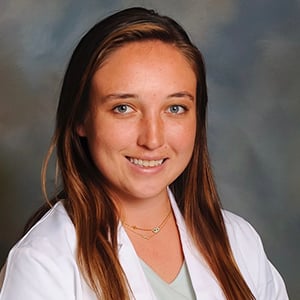 Paige Pammer
Paige Pammer
Paige Pammer is a researcher for the Hematologic Malignancies Program at Penn Medicine’s Abramson Cancer Center in Philadelphia -- one of a few hematologic malignancy research programs in the country approved and funded by the National Cancer Institute. Paige is currently focused on analyzing patient survival data related to the treatment of acute myeloid leukemia (AML). She recently coauthored an article published in the Archives of Clinical and Biomedical Research entitled, Pharmaco-Pheno-Multiomic Integration Reveals Biomarker Profiles and Therapeutic Response Prediction Models in Leukemia and Ovarian Cancer. Paige has a BS in Biology from Temple University, Pre-Health Specialized Studies certificate from the University of Pennsylvania, and is currently pursuing her MD at Drexel University College of Medicine.
Penn Medicine’s Abramson Cancer Center
Assessing Process Capability When Normality Tests Fail
Process capability calculations, such as those for Cpk, Ppk and tolerance intervals, typically assume that your data follow a normal distribution. But what should you do when a test for normality on your data fails? Common reasons for data failing the normality test include that the data are intrinsically skewed, have extreme outliers, or are grouped due to low resolution in the measurement device. Through the use of case studies covering a variety of applications, you will learn strategies for assessing process capability that you can successfully apply to your own non-normal data.
Presented by:
 Cheryl Pammer
Cheryl Pammer
Cheryl Pammer, MINITAB, LLC.
Minitab, LLC
Discover, Predict and Achieve More with RSM
Response Surface Methodology is the ideal tool to Discover, Predict and Achieve your project goals. RSM characterizes the process and accelerates the Discovery curve to bring products to market. You will learn how to leverage sequentially designed experiments (DOE) to Achieve world-class quality.
Presented by:
 Gerald Phillips
Gerald Phillips
Jerry Phillips, M.S. Statistics, is the president and founder of Phillips Statistical Consulting, LLC. Previously, Jerry worked for a highly-regulated manufacturer and distributor of medical devices (disposable infusion systems and hardware). During his 35 year tenure, he participated on cross-functional teams that included engineering, manufacturing, quality and medical professionals to bring new products to market in a timely fashion that meet regulatory requirements. He has extensive experience in optimizing processes through the use of designed experiments (DOE) and process validation. Jerry has developed and delivered statistical training (including Six Sigma) worldwide that has enabled thousands of engineers and scientists to interpret and report statistical results in practical terms.
Founder and President
Phillips Statistical Consulting, LLC
Fraud Detection with Minitab Predictive Analytics
After obtaining the historical data of e-payments, reported as fraud or non-fraud, what do you do with it? Don’t panic. With Minitab and its new Predictive Analytics Module we will follow the path of machine learning methodology to discover the best model to detect future fraud and go live with it.
Co-Presented by:
 Stefano Polastri
Stefano Polastri
Stefano Polastri is a Minitab certified trainer, Data Scientist, Software and Data Architect, CTO @ GMSL s.r.l., Milan. He developed several projects as Data Scientist, Software and Data Architect and applied Statistics expert at multination companies acting in different markets such as Pharma, Manufacturing and Service. He received the M.Sc. degree in Physics and Astrophysics from the University “Statale di Milano”, Milan, Italy, in 2009. Since 2019 he has been working on projects related to the use of applied AI (for example predictive maintenance and fraud detection problems), particularly interested in the usability of the solutions that can be released in the production environment. In the period 2013/2019, he was head software & data architect @ Aruba S.p.A developing software solutions to manage and analyze data. In the period 2009/2019, as consultant, he developed several software for data management and for mathematical and statistical analysis at many companies.
CTO, Software & Data Architect, Data Scientist, Certified Minitab Trainer
GMSL s.r.l.
 Ivano Izzo
Ivano Izzo
Ivano Izzo is a Minitab certified trainer, Six Sigma & DFSS / QbD consultant, at GMSL s.r.l., Milan. He developed several projects as applied Statistics expert at multination companies acting in different markets such as Pharma, Food, Packaging, Energy, Automotive. He received the M.Sc. degree in Mechanical Engineer from the University “Federico II”, Naples, Italy, in 1998; the Ph.D. degree in Biomedical Engineering from Scuola Superiore Sant’Anna (SSSUP), Pisa, in 2005; and the DFSS Black Belt degree from Continental company, in 2015. In the period 2003/2007, he was an Assistant Research at SSSUP, developing instruments for characterization of biological soft-tissues. In the period 2007/2019 he was a Product Engineer, Design FMEA agent, and DFSS coach at Vitesco Technologies (formerly Continental Powertrain), serving in several projects on the Gasoline Direct Injection. He is author and co-author of publications of patens and papers in peer-reviewed international journals and conference digests.
Minitab Suite trainer, Six Sigma & DfSS consultant
GMSL s.r.l.
"A statistician walks into an X-Bar…."
What happens when we can't use an average? What if knowing the average of a data set does us no good in determining central tendency? Can we use the median? What if it's ordinal data? In this session we explore data analysis using Likert Scales, Ordinal Logistic Regression, analyzing company culture and leadership, and trying to find ways that can take subjective data and make it a little bit more objective.
Presented by:
 Erik Sherburne
Erik Sherburne
Erik Sherburne is the Senior Manager of Product Complaints for the Neuromodulation Division at Boston Scientific. He has over fifteen years of diverse experience in the medical device field with leadership roles in post market surveillance, regulatory compliance and operations quality. His focus is on the personal and professional development of the team while driving the company’s growth and business strategy with practical risk mitigation and genuine customer service. Trained as a Six Sigma Black Belt with a liberal arts degree in Music and Mathematics, he likes to take a creative approach to problem solving using statistics and a little improvisation, to find unique answers to common problems.
Sr. Manager, Product Complaints
Boston Scientific
Monte Carlo Simulation in Accident Reconstruction
Accident reconstruction is a field dedicated to the analysis of factors that lead to a crash. In this session, we will discuss how Monte Carlo simulation is used within law enforcement to evaluate likely scenarios and develop conclusions about the cause of an accident.
Presented by:
 Dustin Smietana
Dustin Smietana
Dustin is the Road Patrol Lieutenant in the Chenango County Sheriff's Office located in upstate New York. As an FAA certified drone pilot and accident reconstructionist, Dustin supports accident, event, and fire investigations. As a member of the causation forensics team, he determines how and why an accident happened using car dynamics, photogrammetry, physics, mathematics, engineering, and computer applications, such as simulation tools.
Lieutenant, Road Patrol
Chenango County, NY Sheriff's Office
Applying Taguchi's Methods for Designed Experiments
Genichi Taguchi's two most prominent methods for designed experiments involve fractional orthogonal design matrices and use of the signal-to-noise ratio for analysis of the data. Successfully applying these methods have the potential to make designed experiments extremely efficient for screening and provide exceptional insight for optimization. While Taguchi's matrices are not appropriate for all designed experiments, knowing when they are and how to leverage them will prove valuable to the problem solver. Additionally, Taguchi's methods for data analysis can be applied to any designed experiment. This presentation will start by focusing on when choosing a Taguchi matrix is appropriate. Next, the attendee will learn how to choose the most efficient Taguchi matrix, utilizing Taguchi's linear graphs. Finally, Taguchi's method for analyzing the data will be detailed, with an industry case study to illustrate the benefits.
Presented by:
 Scott Sterbenz
Scott Sterbenz
Scott Sterbenz is a Six Sigma Master Black Belt at Ford Motor Company in Dearborn, Michigan. In this role since 2001, Scott solves customer satisfaction and quality issues using the DMAIC and DFSS toolsets. Scott also serves as Technical Adviser for the United States Bowling Congress, the national governing body for the sport of bowling. There, he helps develop test plans and data analysis methods to set specifications and conduct ground breaking research for the sport. A licensed Professional Engineer in Michigan, Scott holds a bachelor's and master's degree in Mechanical Engineering from Wayne State University in Detroit—having graduated first in his class in both programs. Scott teaches advanced mathematics to middle school students as part of the MathCOUNTS competition program. In his spare time, Scott enjoys mountain biking and motorcycling. He is also an accomplished bowler, with twelve certified 300 games and a high certified three-game series of 853.
Six Sigma Master Black Belt
Ford Motor Company
Navigate the Winding Road of Weibull Reliability
The Weibull distribution has many applications in problem solving, especially when examining life cycle data. Performing the analysis correctly and comprehensively is paramount to properly assess failure mode characteristics, evaluate design or process improvements, and develop efficient test plans.
Presented by:
 Scott Sterbenz
Scott Sterbenz
Scott Sterbenz is a Six Sigma Master Black Belt at Ford Motor Company in Dearborn, Michigan. In this role since 2001, Scott solves customer satisfaction and quality issues using the DMAIC and DFSS toolsets. Scott also serves as Technical Adviser for the United States Bowling Congress, the national governing body for the sport of bowling. There, he helps develop test plans and data analysis methods to set specifications and conduct ground breaking research for the sport. A licensed Professional Engineer in Michigan, Scott holds a bachelor's and master's degree in Mechanical Engineering from Wayne State University in Detroit—having graduated first in his class in both programs. Scott teaches advanced mathematics to middle school students as part of the MathCOUNTS competition program. In his spare time, Scott enjoys mountain biking and motorcycling. He is also an accomplished bowler, with twelve certified 300 games and a high certified three-game series of 853.
Six Sigma Master Black Belt
Ford Motor Company
My Six Sigma Master Black Belt Journey
An Engineer’s Master Black Belt journey following the DMAIC model is reviewed, starting with applied statistics in undergrad Chemical Engineering labs. This journey includes three internships at Crayola, during which various projects were completed, from downtime studies to a Green Belt project that utilized DOEs. The discussion will include a Black Belt project with 250+ input factors, as well as key learnings from using Minitab Engage, leading Green and Black Belt trainings, creating a Black Belt module on Central Composite Designs, and expanding into the application and implementation of Lean concepts. The conclusion of this multi-year journey will be a Master Black Belt project.
Presented by:
 Madeleine Titus
Madeleine Titus
Maddie is a certified Six Sigma Black Belt and a Master Black Belt candidate. She works as a Process Engineer at Saint-Gobain’s Merrimack, NH plant, where she leads Lean and Six Sigma initiatives. In 2022, Maddie completed a Black Belt project that included 250+ input factors and reduced changeover time by 85% using sequential DOEs and robust control plans. Also in 2022, Maddie was awarded The Manufacturing Institute’s STEP Ahead Emerging Leader award, which recognizes 30 women under 30 in the manufacturing industry. Prior to Saint-Gobain, Maddie worked at Armstrong Flooring, where she gained manufacturing experience in a rotational training program, then as a Process Engineer for the Luxury Vinyl Tile line, and finally as a Lean Engineer supporting multiple production lines. Maddie began her statistical journey as an intern at Crayola and used applied statistics in her Chemical Engineering courses at Lafayette College, where she earned her degree in 2018.
Process Engineer II
Saint-Gobain
DMAIC and DOEs with your Customer
Precision Roll Grinders is committed to providing the high-quality ground rolls as well as partnering with customers in order to determine the optimal process settings following the DMAIC process.
Presented by:
 Rich Titus
Rich Titus
Dr. Richard Titus started his Lean Six Sigma journey in 1998 as a Wave I Master Black Belt at Ingersoll-Rand. Rich’s broad experience ranges from hands-on leadership of continuous improvement and Lean initiatives in multiple industries to teaching in a variety of academic and corporate environments. These organizations represent a wide range of industries including defense, energy and consumer products with products varying from highly engineered low volume to high volume consumer products. Savings for these organizations exceeds $50+MM. Rich is an adjunct faculty member in Lehigh University’s College of Business and Economics following a 20-year career at Ingersoll-Rand. He recently earned his Ph.D. at Penn State University in Industrial and Manufacturing Engineering.
Principal and Adjunct Faculty
Titus Consulting and Lehigh University
 Matthew Harris
Matthew Harris
Matthew Harris has worked at Precision Roll Grinders (PRG) starting in 2018 as an Application Sales Engineer. After graduating from Clarkson University with a bachelor’s degree in mechanical engineering, his goal was to secure a position that would emphasize hands-on field work focused on helping customer’s meet their needs and requirements using his engineering education and interpersonal skills. Precision Roll Grinders (PRG), headquartered in Allentown, Pennsylvania, had just created an application engineering position focused on customer service and meeting specific industry needs. This application engineering position was the perfect fit for Matt and he started working with PRG’s customers from his Atlanta, Georgia base. Matt completed this Green Belt training in Georgia followed by his Black Belt Training at Manufacturers Resource Center in Allentown, Pennsylvania. He has since earned his Lean Six Sigma Black Belt Certification and completed numerous studies in the paper, chocolate, soybean, and rubber industry focused on meeting customer needs and requirements.
Matthew can typically be found hiking a mountain on the weekends with his significant other Tori and their dog Rigatoni.
Precision Roll Grinders (PRG)
Make your Process Maps Presentation-Worthy
Making a process map presentation-worthy is less about picking a trendy color and more about empathizing with your audience. In this webinar, Mindy Tomlinson, Product Manager at Minitab, will share key considerations for making your process maps not only aesthetically pleasing, but also very effective as a functional tool. Topics will include creating the structure, decision-making, layout, aesthetics, and use of color.
Presented by:
 Mindy Tomlinson
Mindy Tomlinson
Mindy Tomlinson, Product Manager at Minitab
Product Manager,
Minitab, LLC
Reducing Ship Arrival Times Through Data Analysis
In companies there are problems of different types and intensities that have serious consequences for the competitiveness of the business, that even put its permanence in the market at risk. In this presentation, we will present how we reduce “excessive ship arrival time” strategically using Minitab.
Presented by:
 Miguel Angel Pastor Valverde
Miguel Angel Pastor Valverde
Miguel is an industrial engineering professional with more than 7 years of experience in process analysis and data analysis for the continuous improvement of organizations with successful quantifiable results. He currently leads Six Sigma Projects in one of the largest fishing companies in Peru(TASA). Certified Total Quality Management in Tokyo Japan by AOTS. Six Sigma Black Belt candidate by the American Quality Society. Consultant and professor of problem-solving methods such as TQM, Six Sigma, PDCA in Peruvian companies. Student of Donald Wheeler, leader in the analysis of data through statistics in the USA.
Industrial Engineer, TASA
Feature Engineering: A Key to Better Predictive Models
Feature engineering is the task of using knowledge about a process and its resulting data to extract properties, or features, that make predictive models work. In this session, we will discuss some simple feature engineering techniques, how to apply them in Minitab, and how the techniques fit into the framework of predictive models.
Presented by:
 Tom Williams
Tom Williams
Tom Williams is a Solutions Engineer at Minitab, where he supports the commercial sales teams in the Americas through specialized presentations tailored to helping Minitab customers gain insights utilizing Minitab solutions. Prior to Minitab, Tom has leveraged data to help drive decision making and solve problems in roles with GE Healthcare, IMG Learfield Ticket Solutions, and Penn State Wrestling. Areas of interest and expertise include predictive analytics, design of experiments, statistical process control, visualizing data, Six Sigma, and Monte Carlo simulation. Tom holds a bachelor’s degree in applied statistics and a minor in economics from Penn State University and he is also a certified Six Sigma Black Belt.
Solutions Engineer
Minitab, LLC
Gage R&R for Leak Testing: A Two-Stage Approach
A crossed gage R&R for a custom-built leak tester is reviewed. Extreme part-to-part variation required the use of a two-stage analysis: an attribute data analysis for gross leaks of 1.000 - 5.000 SCCM and a second, variable data analysis for leak rates of 0.0001 - 0.0100 SCCM.
Presented by:
 Jason von Wilpert
Jason von Wilpert
Jason von Wilpert currently works as a Senior Process Engineer at Masimo in Irvine, California. His work involves transferring new designs into manufacturing and he regularly uses several statistical techniques in process development & optimization: measurement system analysis, design of experiments, process capability, ANOVA, and regression. He also supports a variety of continuous improvement efforts and is data-driven in his analysis. He has 32 hours of course credit in "Statistical Tools for Medical Devices" from Minitab and is a regular user of Minitab's support page and blog, and frequently submits questions and observations to Minitab's customer support service. Jason holds an M.S. in Material Science and Engineering from the University of California, Irvine, and a B.S. in Applied Physics from the University of California, Santa Cruz.
Senior Engineer II, Process
Masimo
CHECK BACK SOON!
MORE SESSIONS ARE STILL
TO BE ADDED!
9
PRE-CONFERENCE
WORKSHOPS
Enhance your skills with a pre-conference workshop. Taught by Minitab experts, these workshops cover topics that will help you take an in-depth look at your data and discover new insights. Add a workshop or two to your agenda when registering for the conference!
- You must be registered for the conference.
- Registration is required. Seating is limited.
- Workshops are 4 hours with two 15-minute breaks.
- Lunch is provided.
CHOOSE FROM THE FOLLOWING WORKSHOPS:
Macros for Beginners
Sunday, April 30, 2023
8:00 AM to 12:00 PM
Many times, statistical analysis is needed on structured data that simply changes over time. Some examples include weekly production data and customer billing data. Other times, a common analysis of your data may take 6-8 steps in Minitab. Clicking through the user-interface and setting up the dialog box can be time consuming. In both scenarios, it can be extremely beneficial to fast track your analysis using Minitab command language and basic macros.
Learn to automate your Minitab analysis and save time with macros. Discover Minitab’s command language and learn how to convert your repetitive analysis into a macro. By the end of this hands-on course, you will learn of Minitab’s macro capabilities and be able to write and execute your own simple macros.
Topics include:
- Overview of Minitab Macros
- Setting up the environment in Minitab
- Interacting with Command Line/History Pane
- Session Commands
- Creating and running an Exec macro
Prerequisite
Familiarity with navigating Minitab and Windows.
Sunday, April 30, 2023
8:00 AM to 12:00 PM
Topics include:
- Overview of Minitab Macros
- Setting up the environment in Minitab
- Interacting with Command Line/History Pane
- Session Commands
- Creating and running an Exec macro
Prerequisite
- Familiarity with navigating Minitab and Windows.
Introduction to Predictive Analytics
Sunday, April 30, 2023
8:00 AM to 12:00 PM
Use Minitab’s powerful engine and easy-to-use interface to create visualizations and build models. Learn the basics of predictive analytics including a roadmap for developing and leading a culture of analytics in your organization.
Begin your analytics journey by analyzing data from real world problems to explore and describe relationships between variables. Learn to use the supervised machine learning technique known as CART® to analyze patterns found in historical data to gain better insights, identify potential risks, seek out improvement opportunities, and make predictions about the future.
Topics include:
- Data Visualization
- Modeling Techniques: including Regression, Logistic Regression, and CART
- Cross Validation
- Prediction
Prerequisite
Minitab Essentials – basic understanding of Minitab, hypothesis tests, confidence intervals, p-values, and regression analysis.
Sunday, April 30, 2023
8:00 AM to 12:00 PM
Topics include:
- Data Visualization
- Modeling Techniques: including Regression, Logistic Regression, and CART
- Cross Validation
- Prediction
Prerequisite
- Minitab Essentials – basic understanding of Minitab, hypothesis tests, confidence intervals, p-values, and regression analysis.
Design for Six Sigma
Sunday, April 30, 2023
8:00 AM to 12:00 PM
Overall business improvement cannot be achieved by focusing on reducing variability and waste in the manufacturing processes alone. No matter how well a product is manufactured, if it is overly sensitive to real-world conditions (Noise), meeting and exceeding customer requirements will forever be a challenge. One method to address the aspect of sensitivity to Noise is Robust Design, which is a primary objective of Design for Six Sigma – an approach for taking the operational excellence philosophy of Six Sigma upstream from manufacturing into product and process design.
Learn the concepts and methodology of Robust Engineering (IDDOV) Design for Six Sigma. With this knowledge, your organization can develop robust products and processes to drive operational and enterprise excellence.
Topics include:
- Robust Design and Noise
- Design of Experiments
- Monte Carlo Simulation
- Quality Function Deployment
- Parameter Diagrams
- Voice of Customer
Prerequisite
Minitab Essentials – a basic understanding of hypothesis tests, confidence intervals, p-values, and regression analysis
Sunday, April 30, 2023
8:00 AM to 12:00 PM
Topics include:
- Robust Design and Noise
- Design of Experiments
- Monte Carlo Simulation
- Quality Function Deployment
- Parameter Diagrams
- Voice of Customer
Prerequisite
- Minitab Essentials – a basic understanding of hypothesis tests, confidence intervals, p-values, and regression analysis
Reliability Analysis
Sunday, April 30, 2023
8:00 AM to 12:00 PM
Determine lifetime characteristics of a product using both graphical and quantitative analysis methods. Examine real-world applications containing censored and uncensored data to learn how to correctly handle a wide variety of data structures commonly found in reliability.
Explore the common distributions used to model failure rates and develop necessary skills in choosing these models. Learn how to handle accelerating variables in an accelerated life test. A strong emphasis will be placed on using appropriate probability models to predict important lifetime characteristics of your products
Topics include:
- Parametric Distribution Analysis
- Sample Size for Estimation
- Multiple Failure Modes
- Accelerated Life Testing
Prerequisite
Minitab Essentials – basic understanding of Minitab, hypothesis tests, confidence intervals, p-values, distribution testing, and regression analysis.
Sunday, April 30, 2023
8:00 AM to 12:00 PM
Topics include:
- Parametric Distribution Analysis
- Sample Size for Estimation
- Multiple Failure Modes
- Accelerated Life Testing
Prerequisite
- Minitab Essentials – basic understanding of Minitab, hypothesis tests, confidence intervals, p-values, distribution testing, and regression analysis.
Measurement System Analysis
Sunday, April 30, 2023
8:00 AM to 12:00 PM
Measurement data is used to make decisions about the process and the business in general. Therefore, it is critical for this data to be accurate and precise. A bad measurement system could lead to erroneous decisions. Measurement System Analysis (MSA) is used to build trust in the data used for the decision-making process.
Develop the necessary skills to successfully evaluate and certify manufacturing and engineering measurement systems. Explore the fundamentals of MSA studies for nondestructive and destructive tests. Learn how to incorporate an additional factor such as part location or multiple gages into a MSA Study. Investigate how accurate your measurements are across the expected range of the measurements. Understand how these important quality tools can provide the necessary evidence to trust the data gathered from manufacturing processes.
Topics include:
- Crossed Gage R&R
- Nested Gage R&R
- Gage Linearity and Bias
- Expanded Gage R&R
Prerequisite
Minitab Essentials – basic understanding of Minitab, hypothesis tests, confidence intervals, p-values, and ANOVA.
Sunday, April 30, 2023
8:00 AM to 12:00 PM
Topics include:
- Crossed Gage R&R
- Nested Gage R&R
- Gage Linearity and Bias
- Expanded Gage R&R
Prerequisite
- Minitab Essentials – basic understanding of Minitab, hypothesis tests, confidence intervals, p-values, and ANOVA.
Measurement System Analysis
Sunday, April 30, 2023
8:00 AM to 12:00 PM
For those who have a working knowledge of Minitab command language and the power of Exec macros, it is now time to take your macro writing skills to the next level. Exec macros are a first step in automating your analyses and saving time but offer little flexibility to meet different data structures or user inputs. Many times, there are unknowns about the data, such as how many columns of data to analyze or if the data meets a certain condition for the analysis, such as normality, until the data is already collected and imported into Minitab. Advanced Minitab macros, global and local, can account for these uncertainties about the data and still allow the analyst to automate the analyses from start to finish.
Learn to customize your results beyond using the commands from the History window and transform your Exec macros into more flexible macros. Learn advanced programming techniques and the tricks used by the experts.
Topics include:
- Overview of the three Minitab macros types: Exec, Global, Local
- Understanding of which macro to use and benefits of each
- Macro commands and syntax
- Conditional statements such as Do Loops and If/Else
- Tips and tricks
Prerequisite
Macros for Beginners – familiarity with navigating Minitab and Windows, knowledge of Minitab Exec macros and command language.
Sunday, April 30, 2023
1:00 PM to 5:00 PM
Topics include:
- Overview of the three Minitab macros types: Exec, Global, Local
- Understanding of which macro to use and benefits of each
- Macro commands and syntax
- Conditional statements such as Do Loops and If/Else
- Tips and tricks
Prerequisite
- Minitab Essentials – basic understanding of Minitab, hypothesis tests, confidence intervals, p-values, and regression analysis.
Advanced Predictive Analytics
Sunday, April 30, 2023
1:00 PM to 5:00 PM
For those who understand the basics of predictive analytics using cross validation, it is now time to take your skills to the next level. Ensemble modeling is the process of combining information from multiple base models to improve prediction and reduce the variance.
Learn two common ensemble modeling tools. Random Forests uses bootstrap sampling and out-of-bag validation while TreeNet uses stochastic gradient boosting to model generalized residuals. Both techniques generate many decision trees and use their combined information to create a powerful predictive model. Use the Predictive Analytics Module within Minitab to apply these methods to identify important variables and make predictions about the future.
Topics include:
- Data Visualization
- Bootstrap Sampling and Out-Of-Bag
Validation - Random Forests
- Random Sampling and Learning Rate
- TreeNet
- Prediction
Prerequisite
Introduction to Predictive Analytics – basic understanding of Minitab, regression analysis, and CART.
Sunday, April 30, 2023
1:00 PM to 5:00 PM
Topics include:
- Data Visualization
- Bootstrap Sampling and Out-Of-Bag
Validation - Random Forests
- Random Sampling and Learning Rate
- TreeNet
- Prediction
Prerequisite
- Introduction to Predictive Analytics – basic understanding of Minitab, regression analysis, and CART.
Design of Experiments
Sunday, April 30, 2023
1:00 PM to 5:00 PM
Use Minitab’s customizable and powerful graphical displays to interpret and communicate experimental results to improve products and processes, find critical factors that impact important response variables, reduce process variation, and expedite research and development projects. Real-world applications demonstrate how the concepts of randomization, replication, and blocking form the basis for sound experimentation practices. Develop the skills necessary to correctly analyze resulting data to effectively and efficiently reach experimental objectives.
Learn to generate full factorial designs using Minitab’s intuitive DOE interface. Understand how to account for variables (covariates) that may affect the response but cannot be controlled in the experiment. Explore the opportunities of using repeats to minimize variability while simultaneously optimizing an important product or process characteristic.
Topics include:
- Design of Factorial Experiments
- Normal Effects Plot and Pareto of Effects
- Power and Sample Size
- Main Effect, Interaction, and Cube Plots
- Overlaid Contour Plots
- Multiple Response Optimization
- Analyze Variability
- Blocking and Analysis of Covariance
Prerequisite
Minitab Essentials – basic understanding of Minitab, hypothesis tests, confidence intervals, p-values, and regression analysis.
Sunday, April 30, 2023
1:00 PM to 5:00 PM
Topics include:
- Design of Factorial Experiments
- Normal Effects Plot and Pareto of Effects
- Power and Sample Size
- Main Effect, Interaction, and Cube Plots
- Overlaid Contour Plots
- Multiple Response Optimization
- Analyze Variability
- Blocking and Analysis of Covariance
Prerequisite
- Minitab Essentials – basic understanding of Minitab, hypothesis tests, confidence intervals, p-values, and regression analysis.
Process Capability
Sunday, April 30, 2023
1:00 PM to 4:00 PM
Process capability assesses the ability of a stable process to produce output within specification limits. Capability analysis often assumes a Normal distribution and uses metrics like Cpk, Ppk, and PPM. Learn how to utilize these important capability analysis tools to evaluate your process relative to internal or customer specifications.
Develop the necessary skills to successfully use graphical methods and statistical tests for detecting nonnormal data and choosing an appropriate distribution or transformation for the analysis. Build on the fundamental concepts of capability analysis by learning additional tools for measuring quality levels and assessing process capability when your data are skewed, have extreme outliers, or are multimodal. The emphasis will be placed on manufacturing processes.
Topics include:
- Capability Sixpack
- Capability Analysis Normal
- Individual Distribution Identification
- Capability Analysis Nonnormal
- Capability Analysis Multiple Variables
- Tolerance Intervals
Prerequisite
Minitab Essentials – basic understanding of Minitab, hypothesis tests, confidence intervals, p-values, and graphical analysis.
Sunday, April 30, 2023
1:00 PM to 4:00 PM
Topics include:
- Capability Sixpack
- Capability Analysis Normal
- Individual Distribution Identification
- Capability Analysis Nonnormal
- Capability Analysis Multiple Variables
- Tolerance Intervals
Prerequisite
- Minitab Essentials – basic understanding of Minitab, hypothesis tests, confidence intervals, p-values, and graphical analysis.
Grow your network and build strong relationships with others who are eager to learn and share innovative and proven techniques to transform their organization.
Hearing directly from practitioners how the software is used and connecting with other users made me excited to go back to work and utilize the tools!
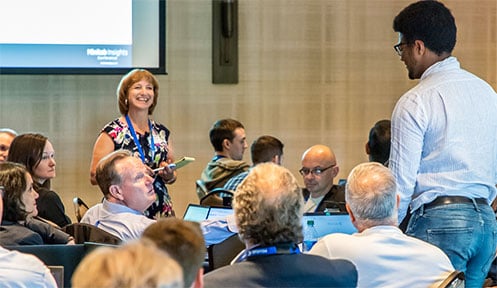
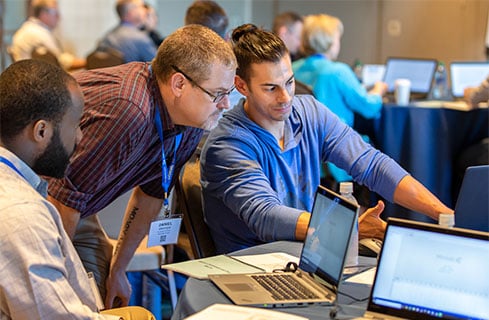
The sessions! This is truly a practitioner’s conference, and it was great to hear all the ways Minitab is used to improve quality in so many industries.
The content, people, and resources (i.e., lab). It was a great group of like minds coming together.
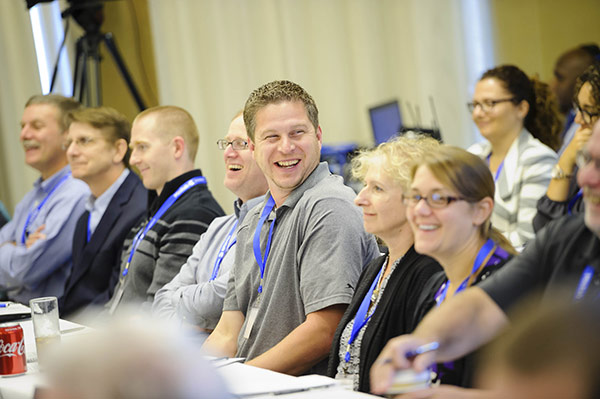
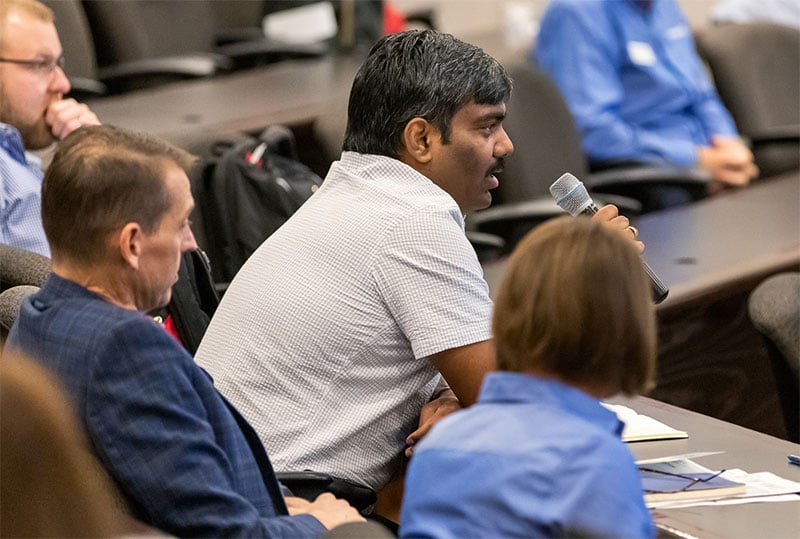
Expectation was to hear from the experts and to expand my professional knowledge as well as meet and interact with attendees to share thoughts. Expectation met!!!!
2023 Conference Pricing
REGULAR REGISTRATION:
$1,250.00 / March 1st through May 2nd, 2023
EACH CONFERENCE REGISTRATION INCLUDES:
- Breakfast and Lunch
- All Day Break Station
- Welcome & Networking Reception
- Keynotes
- Access to over 30 concurrent sessions
- Post conference recordings (available only to attendees)
- 1:1 hands-on advice in the Minitab Solution Center
- Interaction with Minitab Subject Matter Experts
HALF DAY WORKSHOPS PRIOR TO THE CONFERENCE:
Workshops will take place on April 30, 2023 and are 4 hours each
WORKSHOP FEE: $375 each
MORNING WORKSHOPS 8:00 AM – 12:00 PM
Macros for Beginners
Introduction to Predictive Analytics
Design for Six Sigma
Reliability Analysis
Measurement System Analysis
AFTERNOON WORKSHOPS 1:00 PM – 5:00 PM
Advanced Macros
Advanced Predictive Analytics
Design of Experiments
Technical Problem Solving - Root Cause Analysis
Process Capability
YOU DON’T WANT TO MISS THIS
Minitab Insights will be held at the beautiful
Scottsdale Resort at McCormick Ranch Scottsdale, ArizonA

The Scottsdale Resort at McCormick Ranch
7700 E. McCormick Parkway
Scottsdale, AZ 85258
May 1-3, 2023
For more information on the venue, and to book your stay at the Scottsdale Resort at McCormick Ranch, visit the Minitab Insights Scottsdale Resort at McCormick Ranch reservation page soon, rooms sell out quickly!

AIRLINE DISCOUNTS
The resort is just 16 miles from the Phoenix Sky Harbor Airport.
Airfare Discounts will be available for this event. Additional information and codes will be posted as they become available.
AIRLINE DISCOUNTS
Delta Airlines
Meeting Code NY292
Reservations and ticketing are available via www.delta.com/meetings or by calling our Delta Meeting Network Reservations at 800-328-1111. When booking online at www.delta.com/meetings, select 'Book Your Flight' and enter your Meeting Code in the box provided.
United
To make flight reservations online please click on discount code ZN4R241943
You may also call the United Meetings Reservation Desk Monday – Friday at (800) 426-1122 for booking assistance.
Booking fees are waived for Meeting reservations. International customers may contact their local United Reservation Desk.
Need help with justifying your trip?
Click here for an MS Word Template Letter with all the details you need to present to your supervisor.
DISCLAIMER: Third-Party Reservations. Minitab does not solicit hotel rooms, nor do we share any attendee lists with outside marketing companies. Should you receive a call from a housing company please know that these companies are not affiliated with Minitab or with The Scottsdale Resort at McCormick Ranch. You are strongly discouraged from making reservations with these companies as the reservations may not be honored when you check in.
If you receive a call or email from a third-party company, please email the conference organizer at insights@minitab.com.



